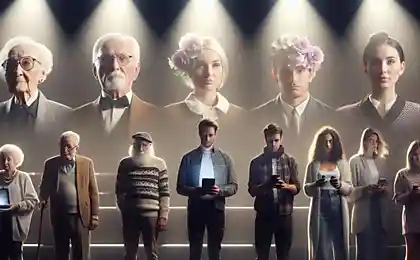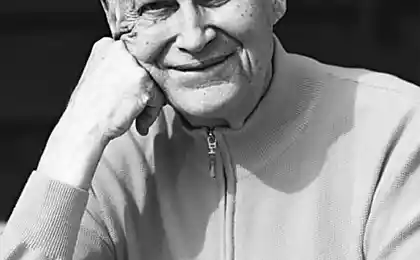640
How time flies: the rhythm of our life rhythms different from previous generations
Many complain about the accelerating pace of life, but if we give aware of the fact that the changed specifically our charts compared to previous eras? In an interview with historian Svetlana Malysheva and sociologist Victor Vakhshtayn told how the economy affects the perception of temporality, is why the inhabitants of the metropolis at the same time, there are different rhythms, and a nightly entertainment associated with the privileges of the upper classes.
Svetlana Malysheva, historian: "The ability to sleep at night was a demonstration of status and well-being»
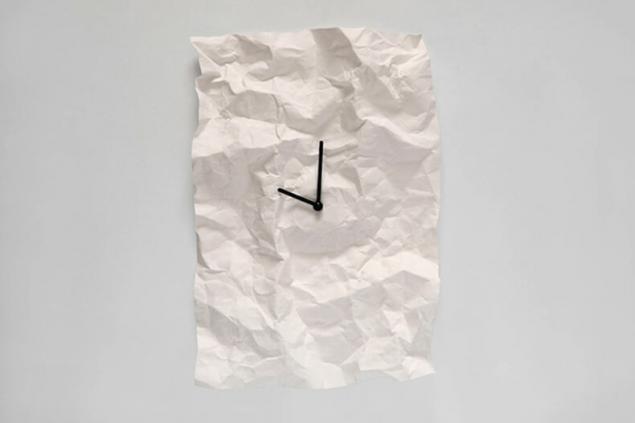
The most important milestone in changing the perception of time was the transition from an agrarian society to an industrial one. In the agrarian society was collective time, cyclical and continuous - all events were experienced together, there was no sharp division at the time of labor and leisure
. Industrial society to break this cycle. The man appeared individual time, which he could carry out is the team, which worked. However, for those who are not accustomed to think themselves beyond the customary community, it often proved to stress.
In the XIV century the town clock there, and it has also become an important turning point in redefining time. Time has always been particularly strongly associated with certain occupations: prayer, time to field, the time the work is completed. Even through time was tied to the daily rhythm of life. In ancient times, there is such a thing - "oblique hour»
. At various times, the light and the dark is different duration. But the dark, and the daytime for convenience divided into 12 hours: day and night, and consisted of 12 hours, but the duration of "day" and "night" hours are different, except for the days of the equinox. Time has been adapted for the representatives of different layers and the "professions". With the clock time is not just calculate, but impersonal, the same for all.
Cultural historian Victor Jivov correctly noted that the owner of the time in Russia has always been a state. In Europe, all the time measurement system was created gradually "from below" - urban culture, the needs of the development of trade. And in Russia, innovations in this area introduced the "top". It is, above all, the "approximation" of Russia to the European calendar, carried out by Peter I and much later, in 1918 - the Soviet government (although experiments with "winter" and "summer" time and continue to occur in our eyes) <. br>
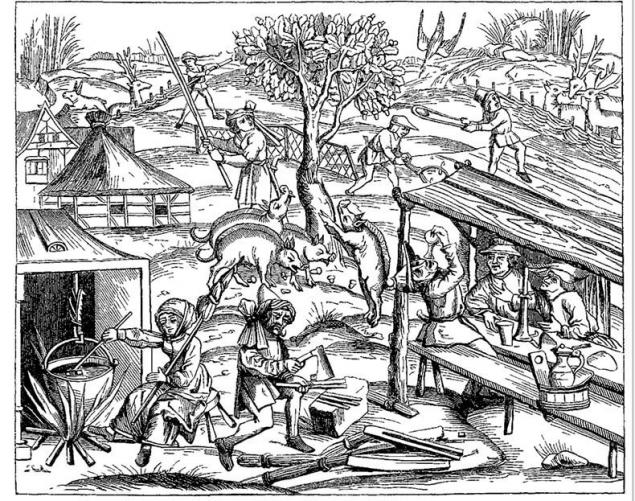
Country Life, 1517
In Western Europe, before we start the process of settlement of problems in industrial plants weekend. But the problem also existed there. After weekends and holidays, which has always lacked, workers practiced the so-called "Blue Monday" - in droves simply did not go to work
. In the Russian Empire, work and leisure time, regulated by the state, and, separately for different social groups. Uniform day weekly schedule was not until the 1917 revolution, and it was the additional factor of social stratification. Of the two groups, holidays Tsarist Russia - "The State ceremonial" (holidays related to the royal family) and "Personnel" (days of religious Orthodox holidays) - the first is an output only for certain urban groups (officials, students and others.)
Different number of days of rest were artisans and workers. The most painful problem for the rest was torgovosluzhaschih - many clerks were forced to work on Sundays, and holidays, with only three days off per year
. Have unlimited leisure time emphasized the status and viability has it, the expenditure of time was "conspicuous consumption." Maybe not sleep at night and indulge in nightlife can be used only by those who did not have to get up at dawn to work. It was a privilege, especially the rich and famous.
Famous actor Vasily Kachalov recalled that when his parents arranged receptions, the mother stopped the clock and halt the window to the guests did not think about the time (and now do in gambling establishments). In the XIX century aristocratic culture was broadcast from the top down: the tradition of nightlife adopt merchants (merchants spree), traders, and then the lower classes
.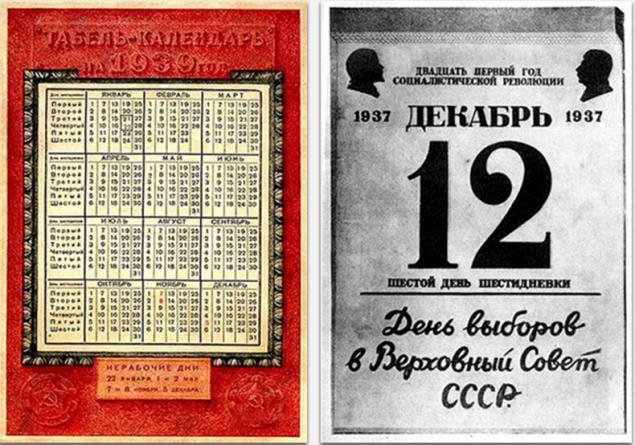
Soviet calendars
At the beginning of the Soviet era, according to the Labour Code, labor collectives on site and the right to choose - what day of the week will be output in any group of religious holidays, he will rest. Soviet holidays are sure to holidays and religious -. Optionally team
This festive and leisure democracy ended by the end of the 1920s .: religious celebrations are gone from the Soviet calendar, and for workers in 1931 introduced a "six days" (a six-day working week with the sixth day of rest). Only in 1940, shortly before the war, the output returned to the usual day - Sunday. And Saturday was the day off just after the war.
Victor Vakhshtayn, sociologist: "Perhaps the standard time will lose its significance»
The problem of time did not let go of sociology throughout the second half of the twentieth century. Fierce controversy revolved around two different ways to think of the relationship between time and the community. At the heart of the first direction, associated with the name of Emile Durkheim and became mainstream, on the idea that time is a social construct, and therefore objective time simply does not exist.
Fell under the charm of Durkheim, anthropologists have carefully studied how different communities in different ways, "time passes." For example, in some cultures, the concept of time does not allow to say "time heals": a person belonging to such cultures do not feel that it is removed from the event which traumatized him eventually
. Immanuel Kant suggested that the time - transcendental category, that is, it is localized in the "imaginary glasses" through which people see the world, because his mind is so constituted. Durkheim tried to strengthen and sotsiologizirovat thesis Kant: man really sees the world through the "glasses", but made them the community to which it belongs to him. Later, however, structural anthropology has tried to highlight the perception of time and the structure was faced with a problem: the anthropologists realized that the "community" - a loose concept, and multi-layer, especially in the modern world
.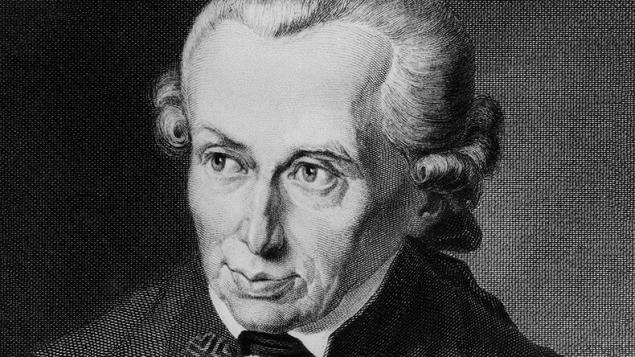
Immanuel Kant
There is a wonderful research anthropologist Darya Dimka, describing what is happening in one Siberian urban-type settlement, when the plant stops there. It turned out that morning factory whistle structured life, different rhythms synchronized.
The mother woke up with buzzer to prepare breakfast for the children, her husband, working to recover from a hangover and went to wash, etc. When the factory closed, gone, and horn, but replaced the familiar rhythm still has not come nothing new: there is no work, and village life former employees to live, too, can not plant ...
What has happened is that Daria called "heterochrony phenomenon" - the total time loss of rhythm. In this village, no institution can not be opened and closed on time - if you need to buy something in the village shop, you can go home to the saleswoman that she stood behind the counter. So the idea that the community creates a rhythm, not so obvious, because both the structure and rhythm can create something else.
Now look at the alternative, which offers us a phenomenology. In her time is not constructed community, but creates it. Alfred Schutz distinguishes four different types of time:
1) Space Time (it is believed that there is a common objective that is similar to the space time, "the time physicists»);
2) durée - the duration of subjective experience (for example, when you sleep, you are in this time);
3) standard civil time - time calendar (this is the answer to the question: what day it is, what day, what hour);
4) the "living present" where people synchronize their prospects in the process of direct interaction.
In the social world dominated by "calendar time", but special moments to the forefront "live the moment". For example, during the Christmas holidays: general rhythm breaks down into many individual interactions arrhythmic
. With regard to the perception of time resident of the city, I recently participated in the student's "Summer School", where one of the groups offered an interesting concept study in which Urban Mobility - when, where, on what to go to everywhere in time - is represented in the metaphor of the game with zero-sum.
You, as in a computer strategy game, have to make decisions, and in case of failure, stroke miss and lose time. And I understood why the twenty-year students so enthusiastically working on this concept: they are experiencing acute sense of loss of time. They are not so important, what will they do with their time (if they win it, will avoid traffic jams, queues, congestion and delay) - but they are afraid of losing him. The metaphor of the game in the modern city works better than a metaphor, "while life».
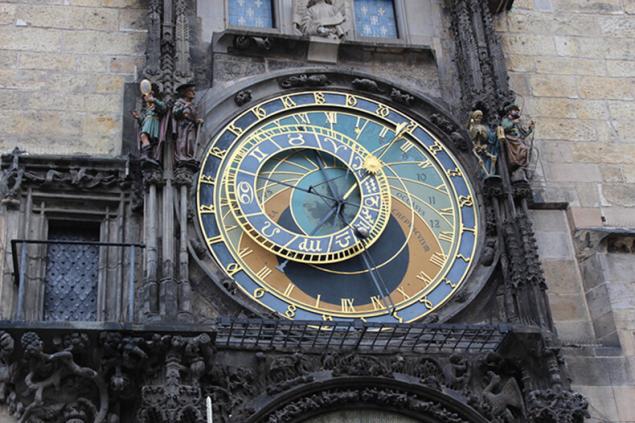
astronomical clock in Prague
In the "living present" people communicates with each other - but none of us does not belong entirely to the order in which the. City poliritmichen, and becoming more poliritmichnym. And then there is the phenomenon of decoupling, rupture and fragmentation of communication formats (which some call frames).
When Erving Goffman read his famous lecture on what's inside the frame "Lecture", lectures themselves were still a really unified communicative format. But today's lecture - it is something else: the sight of the lecturer usually takes place a huge amount of micro-interactions in other, "nested" in a lecture format: view news feeds, correspondence via SMS, correspondence "in contact" with the neighboring desk and so on. d. Each of the frame a rhythmic pattern. And due to the imposition of such rhythmic patterns formed something that we call community.
There are utopian, but not devoid of charm hypothesis that Schutz made the mistake of asserting that dominant in the world of everyday life is the civil standard time and living moment - only a "nice bonus". Perhaps civil time is no longer the dominant temporal structure.
Our life does not unfold in a homogenous standard time: we live from one call to another, from email to email. The determining factor is herself sequencing time communication here and right now.
Svetlana Malysheva, historian: "The ability to sleep at night was a demonstration of status and well-being»

The most important milestone in changing the perception of time was the transition from an agrarian society to an industrial one. In the agrarian society was collective time, cyclical and continuous - all events were experienced together, there was no sharp division at the time of labor and leisure
. Industrial society to break this cycle. The man appeared individual time, which he could carry out is the team, which worked. However, for those who are not accustomed to think themselves beyond the customary community, it often proved to stress.
In the XIV century the town clock there, and it has also become an important turning point in redefining time. Time has always been particularly strongly associated with certain occupations: prayer, time to field, the time the work is completed. Even through time was tied to the daily rhythm of life. In ancient times, there is such a thing - "oblique hour»
. At various times, the light and the dark is different duration. But the dark, and the daytime for convenience divided into 12 hours: day and night, and consisted of 12 hours, but the duration of "day" and "night" hours are different, except for the days of the equinox. Time has been adapted for the representatives of different layers and the "professions". With the clock time is not just calculate, but impersonal, the same for all.
Cultural historian Victor Jivov correctly noted that the owner of the time in Russia has always been a state. In Europe, all the time measurement system was created gradually "from below" - urban culture, the needs of the development of trade. And in Russia, innovations in this area introduced the "top". It is, above all, the "approximation" of Russia to the European calendar, carried out by Peter I and much later, in 1918 - the Soviet government (although experiments with "winter" and "summer" time and continue to occur in our eyes) <. br>

Country Life, 1517
In Western Europe, before we start the process of settlement of problems in industrial plants weekend. But the problem also existed there. After weekends and holidays, which has always lacked, workers practiced the so-called "Blue Monday" - in droves simply did not go to work
. In the Russian Empire, work and leisure time, regulated by the state, and, separately for different social groups. Uniform day weekly schedule was not until the 1917 revolution, and it was the additional factor of social stratification. Of the two groups, holidays Tsarist Russia - "The State ceremonial" (holidays related to the royal family) and "Personnel" (days of religious Orthodox holidays) - the first is an output only for certain urban groups (officials, students and others.)
Different number of days of rest were artisans and workers. The most painful problem for the rest was torgovosluzhaschih - many clerks were forced to work on Sundays, and holidays, with only three days off per year
. Have unlimited leisure time emphasized the status and viability has it, the expenditure of time was "conspicuous consumption." Maybe not sleep at night and indulge in nightlife can be used only by those who did not have to get up at dawn to work. It was a privilege, especially the rich and famous.
Famous actor Vasily Kachalov recalled that when his parents arranged receptions, the mother stopped the clock and halt the window to the guests did not think about the time (and now do in gambling establishments). In the XIX century aristocratic culture was broadcast from the top down: the tradition of nightlife adopt merchants (merchants spree), traders, and then the lower classes
.

Soviet calendars
At the beginning of the Soviet era, according to the Labour Code, labor collectives on site and the right to choose - what day of the week will be output in any group of religious holidays, he will rest. Soviet holidays are sure to holidays and religious -. Optionally team
This festive and leisure democracy ended by the end of the 1920s .: religious celebrations are gone from the Soviet calendar, and for workers in 1931 introduced a "six days" (a six-day working week with the sixth day of rest). Only in 1940, shortly before the war, the output returned to the usual day - Sunday. And Saturday was the day off just after the war.
Victor Vakhshtayn, sociologist: "Perhaps the standard time will lose its significance»
The problem of time did not let go of sociology throughout the second half of the twentieth century. Fierce controversy revolved around two different ways to think of the relationship between time and the community. At the heart of the first direction, associated with the name of Emile Durkheim and became mainstream, on the idea that time is a social construct, and therefore objective time simply does not exist.
Fell under the charm of Durkheim, anthropologists have carefully studied how different communities in different ways, "time passes." For example, in some cultures, the concept of time does not allow to say "time heals": a person belonging to such cultures do not feel that it is removed from the event which traumatized him eventually
. Immanuel Kant suggested that the time - transcendental category, that is, it is localized in the "imaginary glasses" through which people see the world, because his mind is so constituted. Durkheim tried to strengthen and sotsiologizirovat thesis Kant: man really sees the world through the "glasses", but made them the community to which it belongs to him. Later, however, structural anthropology has tried to highlight the perception of time and the structure was faced with a problem: the anthropologists realized that the "community" - a loose concept, and multi-layer, especially in the modern world
.

Immanuel Kant
There is a wonderful research anthropologist Darya Dimka, describing what is happening in one Siberian urban-type settlement, when the plant stops there. It turned out that morning factory whistle structured life, different rhythms synchronized.
The mother woke up with buzzer to prepare breakfast for the children, her husband, working to recover from a hangover and went to wash, etc. When the factory closed, gone, and horn, but replaced the familiar rhythm still has not come nothing new: there is no work, and village life former employees to live, too, can not plant ...
What has happened is that Daria called "heterochrony phenomenon" - the total time loss of rhythm. In this village, no institution can not be opened and closed on time - if you need to buy something in the village shop, you can go home to the saleswoman that she stood behind the counter. So the idea that the community creates a rhythm, not so obvious, because both the structure and rhythm can create something else.
Now look at the alternative, which offers us a phenomenology. In her time is not constructed community, but creates it. Alfred Schutz distinguishes four different types of time:
1) Space Time (it is believed that there is a common objective that is similar to the space time, "the time physicists»);
2) durée - the duration of subjective experience (for example, when you sleep, you are in this time);
3) standard civil time - time calendar (this is the answer to the question: what day it is, what day, what hour);
4) the "living present" where people synchronize their prospects in the process of direct interaction.
In the social world dominated by "calendar time", but special moments to the forefront "live the moment". For example, during the Christmas holidays: general rhythm breaks down into many individual interactions arrhythmic
. With regard to the perception of time resident of the city, I recently participated in the student's "Summer School", where one of the groups offered an interesting concept study in which Urban Mobility - when, where, on what to go to everywhere in time - is represented in the metaphor of the game with zero-sum.
You, as in a computer strategy game, have to make decisions, and in case of failure, stroke miss and lose time. And I understood why the twenty-year students so enthusiastically working on this concept: they are experiencing acute sense of loss of time. They are not so important, what will they do with their time (if they win it, will avoid traffic jams, queues, congestion and delay) - but they are afraid of losing him. The metaphor of the game in the modern city works better than a metaphor, "while life».

astronomical clock in Prague
In the "living present" people communicates with each other - but none of us does not belong entirely to the order in which the. City poliritmichen, and becoming more poliritmichnym. And then there is the phenomenon of decoupling, rupture and fragmentation of communication formats (which some call frames).
When Erving Goffman read his famous lecture on what's inside the frame "Lecture", lectures themselves were still a really unified communicative format. But today's lecture - it is something else: the sight of the lecturer usually takes place a huge amount of micro-interactions in other, "nested" in a lecture format: view news feeds, correspondence via SMS, correspondence "in contact" with the neighboring desk and so on. d. Each of the frame a rhythmic pattern. And due to the imposition of such rhythmic patterns formed something that we call community.
There are utopian, but not devoid of charm hypothesis that Schutz made the mistake of asserting that dominant in the world of everyday life is the civil standard time and living moment - only a "nice bonus". Perhaps civil time is no longer the dominant temporal structure.
Our life does not unfold in a homogenous standard time: we live from one call to another, from email to email. The determining factor is herself sequencing time communication here and right now.









